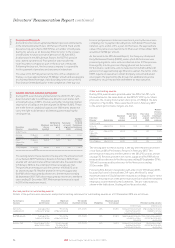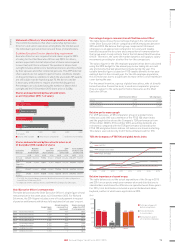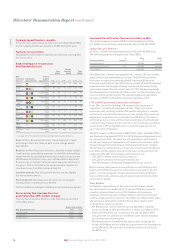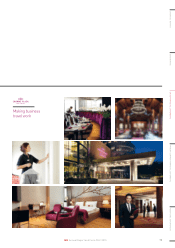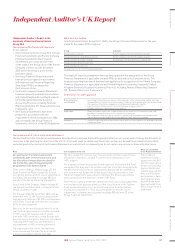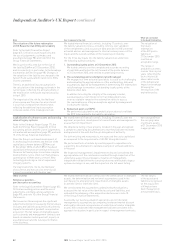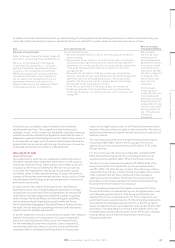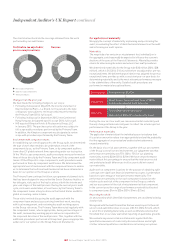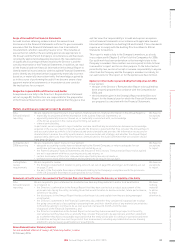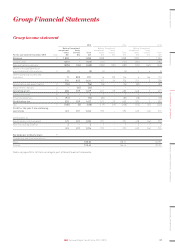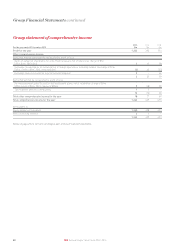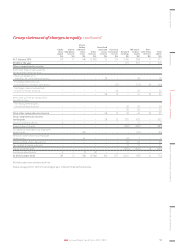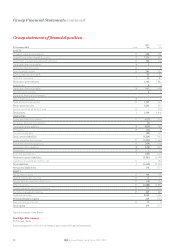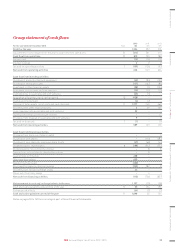Holiday Inn 2015 Annual Report Download - page 85
Download and view the complete annual report
Please find page 85 of the 2015 Holiday Inn annual report below. You can navigate through the pages in the report by either clicking on the pages listed below, or by using the keyword search tool below to find specific information within the annual report.
In the prior year, our auditor’s report included a risk of material
misstatement as follows: “the recognition of deferred tax assets
relating to losses”. In the current year, the stability of profits in overseas
jurisdictions and the related UK tax legislation means that the level of
judgement required in determining the amount of deferred tax assets to
be recognised is no longer a risk of material misstatement that had the
greatest effect on our overall audit strategy, the allocation of resources
in the audit and the direction of efforts in the audit team.
The scope of our audit
Tailoring the scope
Our assessment of audit risk, our evaluation of materiality and our
allocation of performance materiality determine our audit scope for
each entity within the Group. Taken together, this enables us to form
an opinion on the Financial Statements. We take into account size,
risk profile, the organisation of the Group, including IHG’s global
accounting centre in India, and effectiveness of group-wide controls,
changes in the business environment and other factors such as Global
Internal Audit review findings when assessing the level of work to be
performed at each entity.
In assessing the risk of material misstatement to the Financial
Statements, and to ensure we had adequate quantitative coverage
of significant accounts in the Financial Statements, we selected 39
components covering components within IHG’s global accounting
centre in India, the United States, the United Kingdom, and China,
which represent the principal business units within the Group.
The Primary Audit Engagement Team (the Primary Team) performs
the audit on those areas of accounting performed centrally such as
litigation and consolidation adjustments.
Of the 39 components selected, we performed an audit of the complete
financial information of 19 components (‘full scope components’)
which were selected based on their size or risk characteristics.
For the remaining 20 components (‘specific scope components’),
we performed audit procedures on specific accounts within that
component that we considered had the potential for the greatest
impact on the significant accounts in the Financial Statements either
because of the size of these accounts or their risk profile. The risks of
material misstatement included in the table above were subject to full
audit procedures.
The reporting components where we performed audit procedures
accounted for 88% (2014: 86%) of the Group’s profit before tax
adjusted for pre-tax exceptional items and 79% (2014: 77%) of the
Group’s revenue.
For the current year, the full scope components contributed 59%
(2014: 63%) of the Group’s profit before tax adjusted for pre-tax
exceptional items, and 60% (2014: 70%) of the Group’s revenue.
The specific scope component contributed 29% (2014: 23%) of the
Group’s profit before tax adjusted for pre-tax exceptional items,
and 19% (2014: 7%) of the Group’s revenue. The audit scope of these
components may not have included testing of all significant accounts
of the component but will have contributed to the coverage of
significant accounts tested for the Group. This included specific
procedures on the income statement of the InterContinental Hong
Kong hotel for the period prior to its disposal.
Of the remaining components that together represent 12% of the
Group’s profit before tax adjusted for pre-tax exceptional items; none
are individually greater than 4% of the Group’s profit before tax
adjusted for pre-tax exceptional items. For three components, we
performed review scope procedures. For the remaining components;
none of which are individually greater than 2% of the Group’s profit
before tax adjusted for pre-tax exceptional items, we performed other
procedures, including analytical review at both regional levels and
at owned hotels, and testing of journals across the Group to respond
to any potential risks of material misstatement to the Group
Financial Statements.
In addition to the risks identified as part of our audit planning, the Group undertook the following material non-routine transactions in the year
which affected the allocation of resources and the direction of our audit efforts and for which our audit response was as follows:
Risk Our response to the risk
What we concluded
to the Audit Committee
Disposal of owned hotels
Refer to the Audit Committee Report (page 63);
and note 11 of the Group Financial Statements.
We focus on this area due to the disposal
of both InterContinental Paris – Le Grand
and InterContinental Hong Kong in the year
resulting in the recognition of a combined
$873m gain on disposal. Included within the
calculation of this gain is the recognition of
the fair value of the management contract
agreements entered in to as part of the
disposal transactions, the valuation of which
incorporates a number of judgements.
For each hotel disposal:
• We tested internal financial controls over the disposal transaction
and accounting;
• We inspected all key contracts in relation to the sale, including the
sale and purchase agreement and the related hotel management
agreements, to corroborate that the risks and rewards of ownership
of the asset had passed and hence de-recognition of the hotel
was appropriate.
• We agreed the calculation of the accounting gain recognised on
disposal, including the fair value attributed to the hotel management
agreement. We tested the appropriateness of the assumptions
applied to the discounted cash flow models used in determining
the valuation of the management contract.
• Given the size and nature of the disposal gain, we considered
the appropriateness of its classification as an exceptional item
in line with the Group’s accounting policy for such items as set out
on page 98.
We concluded
that the fair value
attributed to the
hotel management
agreements entered
in to as part of both
transactions to be
reasonable and that
the gains recognised
on disposal of the
owned hotels have
been correctly
calculated.
The disclosure
of these gains as
exceptional items are
in accordance with
the Group’s disclosed
accounting policy for
exceptional items and
is in accordance with
the requirements of
IAS 1, ‘Presentation
of Financial
Statements’.
STRATEGIC REPORT GOVERNANCE GROUP FINANCIAL STATEMENTS ADDITIONAL INFORMATIONPARENT COMPANY FINANCIAL STATEMENTS
83IHG Annual Report and Form 20-F 2015



